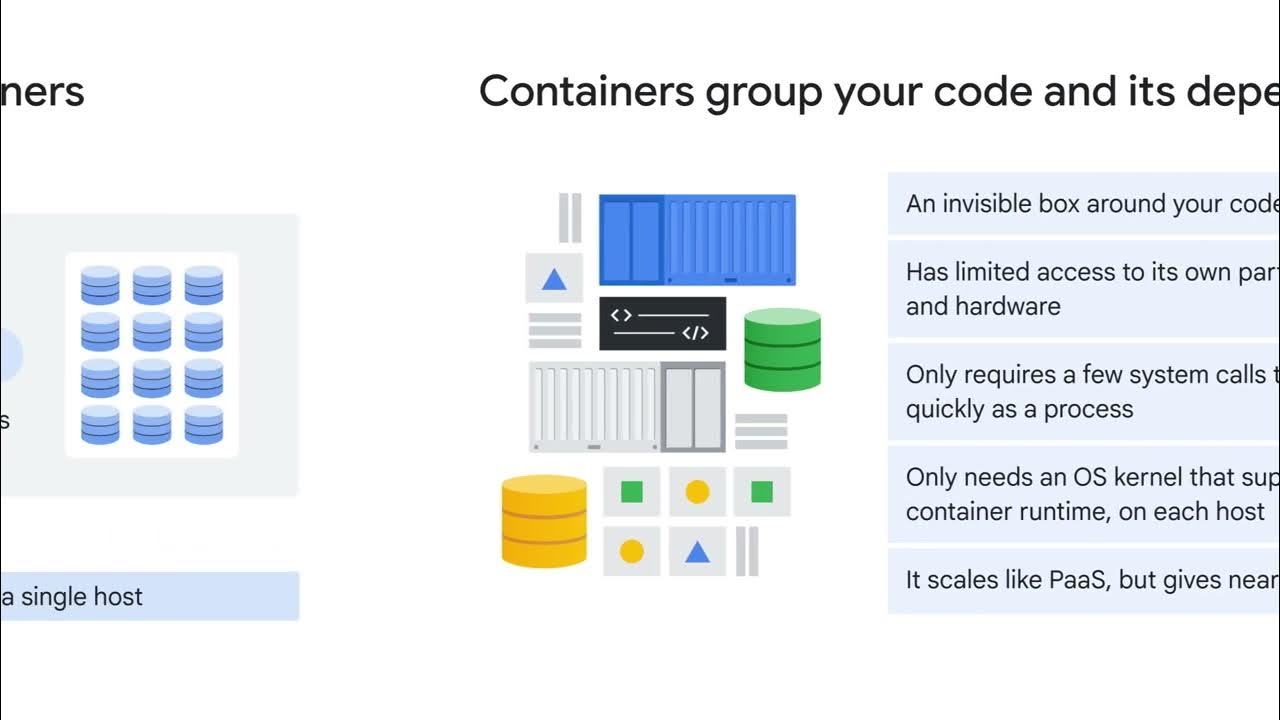Containerizing and Orchestrating Apps with GKE
Summary
TLDRThis section introduces containerization and Google Kubernetes Engine (GKE). It explains how containers offer flexibility between IaaS and PaaS, providing the scalability of PaaS with the customization of IaaS. Containers enable rapid application scaling and portability, making it easier to deploy, manage, and update code across environments. Kubernetes is presented as a tool for orchestrating containers, and GKE is highlighted as a managed service for deploying and managing containers on Google Cloud. The video emphasizes the advantages of using containers for software development, including ease of management and cost-efficiency compared to traditional virtual machines.
Takeaways
- 😀 Containerization offers the flexibility of IaaS with the developer-friendly features of PaaS.
- 😀 IaaS allows developers to share resources and manage their own OS, while containers provide a lighter, faster abstraction for apps.
- 😀 Containers are portable and ultra-fast, starting as quickly as a process and requiring minimal system resources.
- 😀 Virtual Machines (VMs) are slower and require significant resources compared to containers, making them less efficient for scaling.
- 😀 Containers allow for the scalability of workloads and independent scaling of app components, especially in a microservices architecture.
- 😀 Kubernetes is an orchestration tool designed to manage containerized environments, both in the cloud and on-premises.
- 😀 Google Kubernetes Engine (GKE) offers a managed service for deploying and managing containers in Google Cloud.
- 😀 Docker containers simplify the deployment process, allowing apps to be packaged with everything they need to run on any system.
- 😀 Kubernetes automates the management of container clusters, ensuring efficient deployment, rollouts, and health monitoring of applications.
- 😀 GKE is a powerful system built on Kubernetes, providing automated operations and resource efficiency for containerized apps.
- 😀 Google uses containers across its services, with over 2 billion containers launched weekly, showcasing the scale and reliability of this technology.
Q & A
What is the main topic covered in this section of the course?
-This section focuses on containerization and how to leverage Google Kubernetes Engine (GKE) for orchestrating applications.
What is the key difference between IaaS and PaaS?
-IaaS (Infrastructure as a Service) provides virtualized hardware and resources like servers and file systems, while PaaS (Platform as a Service) offers a managed environment for developers to build and deploy applications without managing infrastructure.
How do containers bridge the gap between IaaS and PaaS?
-Containers offer the scalability and abstraction of PaaS but provide nearly the same flexibility as IaaS, allowing applications to be easily portable across different environments.
What is the biggest challenge with virtual machines (VMs) in terms of scaling?
-The main challenge with VMs is that they require copying entire VMs with large guest OS images, which can be slow and costly, especially as demand for the application increases.
How do containers improve scalability compared to VMs?
-Containers start as quickly as a process and require minimal system resources, making it easier to scale applications rapidly by deploying many instances of containers without the overhead of full VMs.
What is the primary advantage of using App Engine over traditional VMs?
-App Engine automatically scales your app based on demand, without the need to manage infrastructure, though it limits your ability to fine-tune the underlying architecture for cost optimization.
What role does Kubernetes play in container orchestration?
-Kubernetes is a tool that automates the management of containerized applications, handling tasks like networking, data storage, deployment, and monitoring, making it easier to scale and manage container environments.
What is Google Kubernetes Engine (GKE)?
-GKE is a managed service that runs Kubernetes clusters in Google Cloud, simplifying the deployment, scaling, and management of containerized applications in the cloud.
How does Docker contribute to containerization?
-Docker is a platform that packages an application and its dependencies into a container, making it portable across any environment that supports Docker, thus simplifying application deployment and management.
Why is portability important in containerized applications?
-Portability allows developers to move their applications seamlessly between development, staging, and production environments, whether on local machines, cloud platforms, or on-premises servers, without the need for rebuilding or modification.
Outlines

هذا القسم متوفر فقط للمشتركين. يرجى الترقية للوصول إلى هذه الميزة.
قم بالترقية الآنMindmap

هذا القسم متوفر فقط للمشتركين. يرجى الترقية للوصول إلى هذه الميزة.
قم بالترقية الآنKeywords

هذا القسم متوفر فقط للمشتركين. يرجى الترقية للوصول إلى هذه الميزة.
قم بالترقية الآنHighlights

هذا القسم متوفر فقط للمشتركين. يرجى الترقية للوصول إلى هذه الميزة.
قم بالترقية الآنTranscripts

هذا القسم متوفر فقط للمشتركين. يرجى الترقية للوصول إلى هذه الميزة.
قم بالترقية الآن5.0 / 5 (0 votes)






